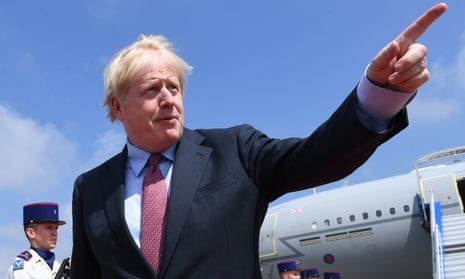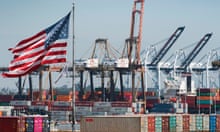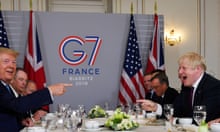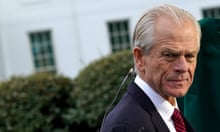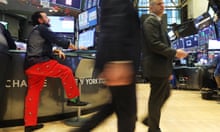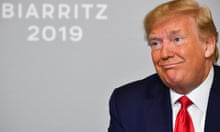Boris Johnson has waded into the escalating trade row between the US and China, saying he wants to see tariffs removed.
Speaking to reporters en route to the G7 summit in Biarritz, the British prime minister said he was “very, very concerned” about the tit-for-tat conflict between the US and China. The two countries have imposed tariffs on a swath of each other’s imports, as the White House accuses Beijing of unfair competition, and China retaliates.
On Friday, Trump issued a series of bizarre tweets, including one “ordering” US firms to divest from China, after Beijing announced new retaliatory measures.
Asked about the issue on Saturday, Johnson said: “This is not the way to proceed. Apart from anything else, those who support the tariffs are at risk of incurring the blame for the downturn in the global economy, irrespective of whether that is true.
“I want to see an opening up of global trade, I want to see a dialling down of tensions, and I want to see tariffs come off.”
Johnson is expected to discuss the possibility of a trade deal with the US when he meets Donald Trump on Sunday, although he has made clear that the National Health Service cannot form part of any agreement.
The US president has called the prime minister “Britain’s Trump”, and the pair struck up a rapport when Johnson was foreign secretary. However, Downing Street has been keen to avoid any sense that Johnson will be a pushover, or turn his back on Europe.
Johnson, who is also scheduled to meet Donald Tusk on Sunday, reiterated his demand on Saturday that the EU27 remove the Irish backstop from the Brexit withdrawal agreement.
“I will make it absolutely clear: I don’t want a no-deal Brexit, but I say to our friends in the EU, if they don’t want a no-deal Brexit, then we’ve got to get rid of the backstop from the treaty,” Johnson said.
Asked when Britain would put forward detailed plans for avoiding a hard border, Johnson said: “We’ve been very clear that we won’t be instituting any kinds of checks or controls at the Northern Irish border; we don’t think that any such controls are necessary.
“There are a large range of alternative arrangements, with which you’ll be familiar. We’ll be discussing those with our friends in the coming weeks,” he said.
Earlier on Saturday, Tusk told a press conference the EU was prepared to examine concrete proposals from the UK, but also asked whether Johnson wanted to “go down in history as Mr No Deal”.
The European council president has previously said there is a “special place in hell” for people who argued for Brexit without a plan for carrying it out, a remark widely read at the time as being directed at Johnson, among others.
Asked about the remark on Saturday, Johnson said: “I have great relations with our friends and partners in the EU, and intend to improve them the whole time, without getting into any post-Brexit eschatology.”
Downing Street hopes the meeting with Tusk will be constructive enough to help Johnson convince potential Tory rebels that a deal remains within reach.
Johnson must navigate a treacherous fortnight in early September when MPs return to Westminster after the summer recess, with Labour threatening to table a vote of no confidence in his fragile government.
Conservatives determined to prevent a no-deal Brexit may be prepared to stay their hand if the signals from EU capitals are sufficiently encouraging – though they fear Johnson’s demand that the backstop be removed from the withdrawal agreement makes it impossible to reach a deal by the 31 October deadline.
In a summit that will mark his first formal outing on the world stage, Johnson will underline Britain’s determination to remain outward-looking and multilateralist after Brexit – and try to burnish his credentials as an international statesman.
His meeting with Trump will be their first talks face-to-face, though the pair have already spoken repeatedly on the phone.
